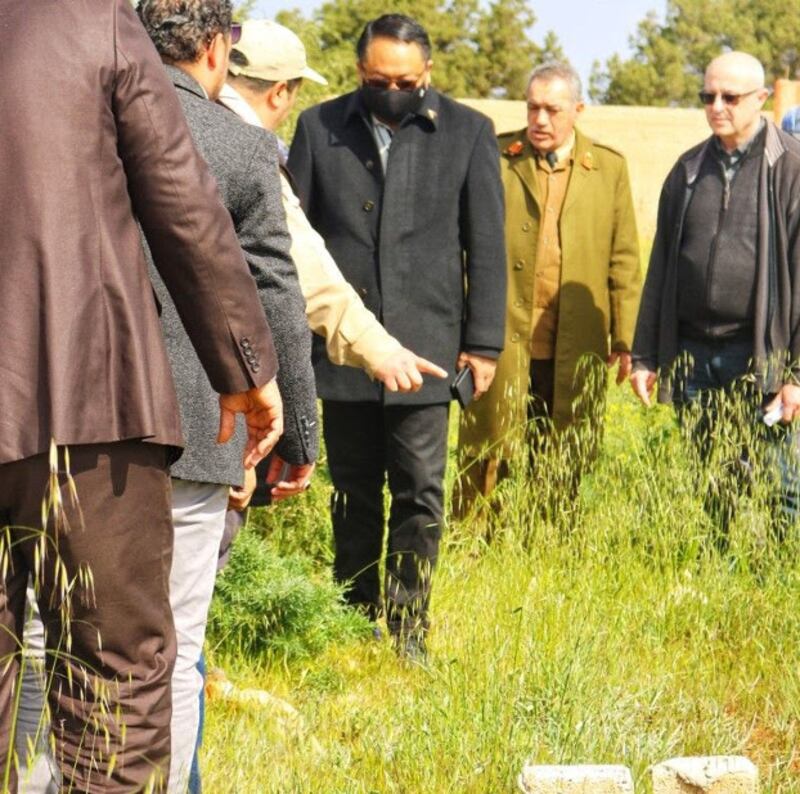The bodies of four Filipino workers who were abducted by Islamic State militants from southern Libyan oil fields in 2015 have been found, the Philippine Department of Foreign Affairs announced Wednesday.
The four were taken from the Ghani Oil Field along with two co-workers from Austria and the Czech Republic, said Elmer Cato, head of the Philippine mission in Libya. There had been scarce news about the fate of the six victims until 2017, when a video of their execution was found in a laptop seized from dead Islamic States fighters in Derna.
The victims’ bodies “have finally been located in a cemetery in the eastern coastal city of Derna” on Monday, Cato said in a report to the Department of Foreign Affairs.
“After six long years, the families of four kababayans (compatriots) will finally find closure,” Cato said. “We are indebted to our Libyan friends for making this possible.”
He said the families of the four – Donato Santiago, Gregorio Titan, Roldan Blaza and Wilson Elique – had been notified. Arrangements for forensics experts to assist in identifying the bodies and bringing them home have been made.
The six oil workers were employed by Value Added Oil Services, an Austrian contractor which had presumed they were dead although their bodies had not been recovered, Cato said.
He said authorities were informed in 2018 that the bodies of the Filipinos could be among those recovered by the Libyan Red Crescent in Derna. Because of the unstable security situation in the region, embassy staff were unable to travel to Benghazi until October 2020 to secure assistance from Libyan authorities to locate the bodies.
Libyan authorities led Cato and embassy staff to a cemetery outside of Derna where the bodies were discovered.
Thousands of Filipinos work in Libya as laborers in oil fields, in construction sites or nurses and hospital staff. The government previously stopped deployments of workers there because of political violence that led to the death of Libyan leader Muamar Gaddafi in 2011.

Suspect in massacre of Bangladeshis arrested in Libya
The bodies of the Filipinos were located on Monday, the same day one of the main suspects in the killing of 30 people, including 26 Bangladeshi migrants, was arrested in Libya, according to Agence France-Presse.
The family of a human trafficker killed by migrants allegedly avenged his death by slaying 26 Bangladeshis and four migrants of African origin in May 2020. The massacre took place in the city of Mezdah, more than 150 km (90 miles) south of Tripoli, Libya’s capital.
The 23-year-old suspect “confessed his crime” under questioning, the Libyan interior ministry said, without revealing his identity, AFP reported.
“The arrest of the main suspect is a major victory,” Libyan Interior Minister Fathi Bashagha told AFP. He said the arrest proved that these crimes could not be committed with impunity in his country.
In June 2020, a Bangladeshi accused of heading a trafficking ring linked to the incident was arrested in Dhaka.
The arrest came just days after 148 migrant workers returned to Bangladesh from Libya on Feb. 24 on a special flight in cooperation with the International Organization for Migration.
“The flight also carried bodies of seven Bangladeshis who died in Libya at different times,” Shariful Hasan, head of the Bangladesh Rural Advancement Committee migration program, told BenarNews.
Most of the returnees had ended up in Libya while traveling to Europe on travel visas.
“All the 148 people had been stranded for 10 to 15 years in Libya,” he said.
Jesmin Papri in Dhaka contributed to this report.
